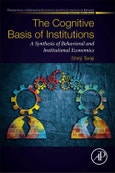The Cognitive Basis of Institutions: A Synthesis of Behavioral and Institutional Economics synthesizes modern research in behavioral economics with traditional institutional economics. This work emphasizes that institution and agent are inextricably linked, and that both cognitive and institutional processes coalesce to influence human decision-making. It integrates cognition and institution through the behavioral economics theoretical lens of bounded rationality. Methodologically, it develops game-theoretical, complexity and neuroeconomic solutions to unite study of the two areas. The work concludes by proposing general implications for the economic study of decisions using the cognitive-institutional approach, also providing specific recommendations for public policy.
Please Note: This is an On Demand product, delivery may take up to 11 working days after payment has been received.
Table of Contents
1. Introduction: What Are Institutions? 2. Institutions and the Economics of Behavior I 3. Institutions and the Economics of Behavior II 4. Why Bounded Rationality? 5. Emergence of Prosocial Behavior 6. Cognition and Order 7. Society and Knowledge 8. Understanding Institutional Evolution








